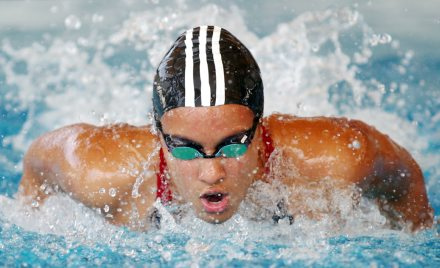PH Olympic medal drought persists
LONDON—BMX rider Daniel Caluag’s incredibly hollow pledge of a fight could well mirror the Philippines’ ignominious campaign at the 30th London Olympics here.
Save for boxer Mark Anthony Barriga and, perhaps, Marestella Torres, the 11-athlete national contingent went to battle full of fight but without the weapons to conquer the world.
After all, this is the Olympics, where no Filipino has ever won a gold medal.
The Filipino-American Caluag rounded out the country’s second-worst performance ever in the Summer Games by failing to advance past the heats, the same fate that befell everyone else except Barriga in the face of the remarkable opposition.
Only the country’s showing at the Beijing Olympics four years ago eclipsed these Games in terms of futility, and only because Barriga prevailed in his first-round bout here only to crash out in the second.
Not one Filipino won a fight or made it past the first round in Beijing.
Swimmer Jessie Khing Lacuna, the first to fall among the Filipinos, got a nasty taste of world-caliber competition and bombed out at the first hurdle.
The 18-year-old finished second to last in his heat’s squad of six with a time of 1 minute 52.91 seconds in the 200-meter freestyle and wound up 36th in a field of 40.
The next day, female lifter Hidilyn Diaz blew all three attempts to clear an opening weight of 118 kg in the clean and jerk and followed Lacuna to the exit, her bid to improve on her
Beijing Games showing in tatters. She earlier lifted 97 kg in the snatch, good for 12th in field of 18 in the 58 kg competition.
Skeet shooter Brian Rosario shot a paltry 19 in the second of five strings in the chilly, wind-swept range at the Royal Artillery Barracks and was never in contention again in his maiden Olympics.
The businessman from Malabon shot a total of 110 on strings of 22-19-25-22-22 and wound up 31st in a field of 36, his total a huge 13 birds behind the Olympic-record 123 by American defending champion Vincent Hancock.
In between came archers Rachelle Anne Cabral and Mark Javier’s setbacks in the first knockout duels of the 70-meter competition while swimmer Jasmine Alkhaldi floundered in her heat of the 100m freestyle.
The 19-year-old daughter of a Saudi Arabian businessman and his Cebuana wife ended up fifth with a time of 57.13 seconds, 21 hundredths of a second off her personal best of 56.92 in finishing 35th in a field of 48th.
Cabral gave herself little chance of pulling the rug from under an off-form world No. 8 Anna Stepanova of Russia and came to grief at Lord’s Cricket Ground in West London. Unused to shooting in a narrow two-bay range framed on three sides by galleries, the 27-year-old from Tuguegarao, Cagayan, bowed to Stepanova, 1-7, on match scores of 23-22, 23-18, 25-25, 27-22.
Javier did a bit better the next day but was still no match to former world No. 1 Ellison Brady of the United States. The 31-year-old repeat Olympian from Dumaguete City was the sixth Filipino to tumble out of these Games, also losing 1-7 on set scores of 27-29, 25-28, 25-25 and 22-29.
Filipino-Japanese judoka Tomohiko Hoshina stood no chance against the taller South Korean Kim Sung-min on the eighth day of the Games and lost by ippon (full-point throw). The 22-year-old son of a Japanese soldier and a Filipino mother from Malolos, Bulacan, was sent packing one minute and five seconds into their first-round heavyweight (110 kg) clash.
Then Barriga fell victim to one of the biggest robberies in the highly controversial boxing competition where, at the last count, 12 national teams have contested the results of a total of 18 bouts.
The wily 5-foot counterpuncher from Panabo, Davao del Norte, started the third and last round with a 2-point lead only to run into a desperate Birzhan Zhakypov, who transformed himself into a raging wrestler. A 2-point penalty, ostensibly—and disputedly—for ducking, wiped out Barriga’s lead and his dream Olympic run ended in a heartbreaking 16-17 defeat.
Barriga’s stunning exit preceded Torres’, although it was to the veteran long jumper’s misfortune that she vied in her second Olympics on her off day. Despite a shorter qualification leap that was well inside her national record of 6.71m, Torres—perhaps the best prepared among the Filipinos—could do no better than 6.22m.
Complaining of the biting cold on the runway, she missed becoming the first Filipino to make the Olympic long jump semifinals by 18 centimeters, about the size of her track shoes.
Rene Herrera may have banished the thought of making the semifinals ahead of his 5,000m run but his 14 minutes of fame at the tail of his heat at the Olympic Stadium easily made him the most popular among the embattled Filipinos here.
The diminutive steeplechase ace from San Jose, Guimaras province, who was still on the track long after the winner of the heat, Hayle Ibrahimov of Azerbaijan, had crossed the finish line, fed off the 80,000-strong gallery’s applause to post a personal best of 14 minutes and 14.11 seconds, a huge improvement on his old PB of 15:01.26.
It was up to Caluag then to make a statement and confirm his status as a medal potential in the bicycle motocross event. After a second-to-last placing in the seeding run, the much-hyped Filipino-American crashed out dead last in his five-run heat the next afternoon, effectively closing the Philippines’ Olympic drive on a somber note.
That means the cobwebs of fruitlessness that have coated the country’s Olympic campaigns have taken a new layer. Like a pernicious flu, the pain of a medal drought has now persisted through four Summer Games.

